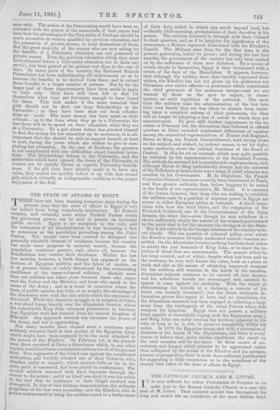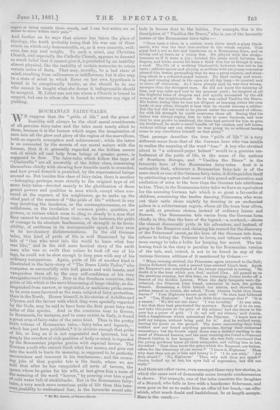THE CATHOLIC CHURCH AND M. LITTRE.
TT is very difficult for either Protestants or Sceptics to be quite just to the Roman Catholic Church in a case like that of M. Littrd. That eminent savant was throughout his long and useful life an unbeliever of the most definite kind. Upon the quality of his unbelief, as described by himself in his philosophic " testament," we have something to say later on ; but it involved undoubtedly a complete rejection of the funda- mental ideas of every Christian Church, if not of the possi- bility of the supernatural. So deep did M. Dupanloup, the Bishop of Orleans, consider his unbelief to be, that he made M. Littr6's exclusion from the Academy a condition of his own attendance at its meetings, as essential to preserve the sanctity of his office, and from the day of the sceptic's admission was never again seen within its walls. Nevertheless, M. Littr6 was before his death received into the Catholic Church, and was buried with all religious ceremonies by the Catholic clergy in consecrated ground. M. Littr6's wife and daughter were, it is stated, devout Catholics ; they besieged him for the last years of his life with their prayers and tears, and in his last illness they obtained from him some sort of consent, tacit or expressed, that the offices of the Church should be performed on his behalf. They were the more anxious, it should be added, because M. Littr6, the son of a determined Jacobin, and born in the height of the Revolution, had never been baptised, his father deeming the ceremony superstitious or unnecessary. He was there- fore baptised and received the viaticum in the same hour, and was buried by the clergy with all religious rites, amidst audible and somewhat discourteous protests from a great concourse of sceptical friends. The sceptics were, in fact, furious, and denounce the action of the priesthood as an outrage upon liberty of con- science, upon personal freedom, and upon common-sense. M. Littr6 was, they say, too • old to possess free-will; he was a prisoner in the hands of his family, and as ho cannot have changed in a moment the opinions of a life, Rome, in perform- ing her offices, was guilty of a profane act of hypocrisy, insti- gated only by a desire to appear to have conquered so obdurate an opponent. She, in fact, stole an apparent victory, at the cost of professing to believe what she did not believe at all. The occurrence has visibly increased the virulence of the con- test always raging in Paris, and will, it is declared, from its immense publicity, have a considerable influence upon the great political war which so many believe to be imminent between the Republicans and the Clerical body.
It is not unnatural that the Sceptics should be angry. M. Littr6 had been a leader among them, and a very valued leader, being quoted everywhere as the most visible example of a man who, exhibiting every Christian virtue, leading an almost ascetic life, and devoting himself to a labour which he deemed philan- thropic, yet shared the extremest views of those who declare the idea of God to be needless to morality. The sceptics are now-a-days actuated by a spirit of propagandism as zealous as that of any Jesuit, zealous even unto slaying ; they are fond of illustrative cases, and they are well aware that one of the strongest obstacles to their propagandism is the widespread belief that the infidel cannot face the approach of death, that in the last hour the sight clears, and that the mind perceives truths which, while the body was healthy, it had obstinately— or it might be stupidly—rejected. Any evidence in favour of such a belief annoys them profoundly, and when they suspect the evidence to be forged, their anger against the presumed forgers rises to heights, and is indulged with expressions, which certainly do much to justify the fear of the French devout that, under certain circumstances, an active persecution of Christianity would again be possible in France.
The anger is natural, however, though its expression is so
violent, but what a strange depth does it reveal in the intellectual chasm between the Church and the sceptics Most of the sceptics are bred Catholics, all of them dwell in a Catholic country, the ideas of Catholicism envelope them like an atmosphere ; yet
they cannot perceive that the Romish priesthood have in such cases no option, and are, on any hypothesis, as guilt- less as men without free-will. The sceptics hold the priests to be almost villainous, or quite villainous, for doing that which, if they did not do, they would proclaim themselves hypo- critical unbelievers. They will have it, in spite of the plainest evidence, that the Catholic Church is bound, by its own laws, to win an intellectual victory, before it can exert its spiritual authority, even to help in saving souls. A Protestant Church might assort that, though we know of novo which is wholly convinced on the point, the most consistent Calvinist still un- hesitatingly baptising an infant ; but it is the very essence of the Catholic theory that the Church can convey certain privi- leges from without, that she can accept submission, if volun- tary, as a sufficient sign of grace, and can, by baptism and the eucharist more especially, confer an unspeakable benefit, accompanied, no doubt, by an unspeakable liability. She has so baptised Jews, for example, in thousands. Having the power, she is bound, by the very condition of her existence, to exert it. In her view, the unbaptised are in danger, unless protected by invincible ignorance, of damnation ; and to refuse to baptise a. man who, like
M. Littr6, was aware of the doctrines she taught, and con- sented, however quietly or tacitly, to baptism, would have been
to proclaim baptism useless, her own teaching false, and her own claims vain and exceedingly arrogant inventions ; or else it would have been an act of inhumanity to which almost any conceivable act of cruelty would be kind. The priests who baptised M. Littr6 may, for aught we know, have been bad men, or proud men, or self-seeking men ; but, supposing them believers in their own creed, as the immense majority of them are, their conduct, had they refused to obey Madame Littr6's summons, must, in their own eyes, have been worse than any ordinary
crime, a direct and wilful denial of their faith. Everybody sees that in the almost similar case of Father Huddleston and
Charles II., because Charles was " only " bad morally ; but they deny it in the case of M. Littr6, because on the Roman thesis he was bad intellectually. What makes the priest's action in the one case an act of courageous humanity, and in the other an act of revolting arrogance and indecency ? The priests could do no otherwise.
It is not our business or our care to defend the Roman priest-, hood, but injustice of this gross kind always deepens our sense of the depth of the cleavages which are dividing Catholic from
sceptical society, and M. Littr6's case interests ns as Pro- testants from some special intellectual features. The Protes- tant idea, we fancy, differing in that from the sceptical idea, is auger with the priesthood, not for offering pardon, but for accepting so late a submission as a reason for offering it. That strikes Protestants as contrary to the whole teaching of Rome. Yet of all the cases of scepticism we have read of, M. Littr6's seems to us, as Protestants, most clearly to deserve lenient treatment at the hands of Catholics, for his condition of mind approached nearest to what the Doctors of that Church must mean by " invincible ignorance," the saving words by which they defend themselves from declaring all heretics, even, say, Tibetan Lamas, who never saw a Christian, hopelessly lost. A man of pure and even austere life, actively benevolent, and devoted to work of a kind no Church condemns, M. Lithe was, in his latest years at least, as far removed from an aggressive un-
believer as it was possible to be. A biographet in the Pall Mall Gazette, who evidently enjoyed his close friendship, describes him
as a man profoundly sad, profoundly lonely, who under the most terrible of temptations, that of drawing his daughter's mind nearer to his own, refused to exert his mental power to shake her faith ; and while devoting himself to her intellectual education,
handed over her spiritual education exclusively to his wife and her directOr. He positively refused, when urged by his disciples, to deviateIrom that course, which is surely the course of a man who cannot believe rather than of one who will not ; who can- not unclose his mind to certain ideas, any more than some men can unclose their ears to music, or their eyes to natural beauty, but who perceives that inability himself, and believes it an inability. There are thousands among us who cannot compre- hend a metaphysical statement, and therefore will not accept it or act upon it, and who give it up with neither despair, nor pain, nor pleasure, nor, above all, arrogance, but with only a sense, often half-humorous, of inability. This is the idea running through M. Littr6's " testament " :— " Some pious souls have troubled themselves about my conscience. It has seemed to them that, not being an absolute contemner of Christianity, and heartily acknowledging that it possessed grandeur and conferred blessings, there were chords in my heart that it might touch. It was a beginning of faith, they thought, to entertain neither hostility nor contempt for a faith which has reigned for many centuries over men's consciences, and which even now is the consolation of so ninny faithful souls. As I never experienced nor expressed repulsion or uneasiness in finding myself the subject of the feelings that I have just sketched, and as ago and illness warned me of my approaching end—as they have never abandoned the hope that I might experience the sovereign effect of Divine grace, nor ceased to appeal from the mature man, too proud of his strength, to the old man henceforth accessible to the promptings of his weak- noss—I reply to these solicitations, without wishing to wound their feelings, by saying that I neither share their faith nor experience any misery at being unable to believe. I have questioned myself in vain. It is impossible for me to accept the conception of the world which Catholicism imposes upon its true believers; but I fool Ile regret at being outside these creeds, and I can feel within mo no desire to enter within their pale."
And further on he says that science has taken the place of theology, the truth probably being that his was one of those minds ou which only demonstrable, or, as it were concrete, evid- ence has any real weight. To such a mind, any Christian Church, and especially the Catholic Church, appears to demand so much belief that it cannot give it, is precluded by an inability almost physical, like the inability of certain memories to retain certain series of facts. That may, morally, be a bad state of mind, resulting from callousness or indifference; but it also may be a state of mind to which Rome on her own hypothesis is bound to be exceptionally tender, as she should be to one who cannot be taught what she deems it indispensable should be accepted. M. Littr4 was not one whom a Church is bound to suspect, but one in whom she is bound to welcome any sign of yielding.






























 Previous page
Previous page